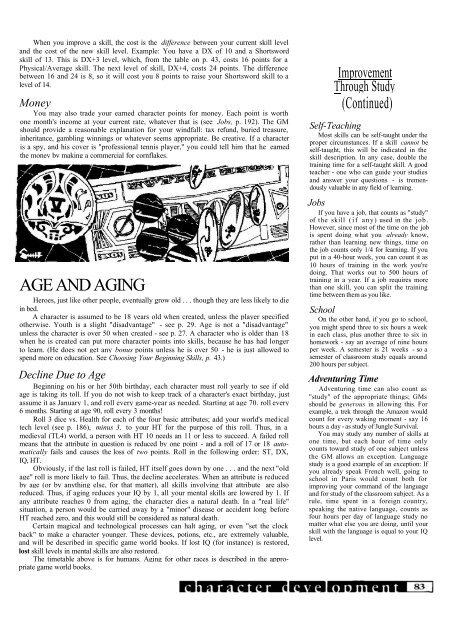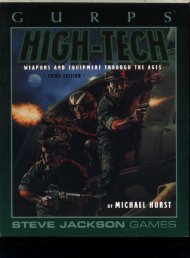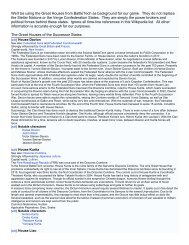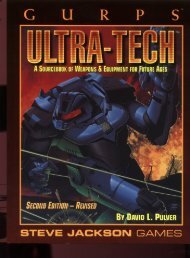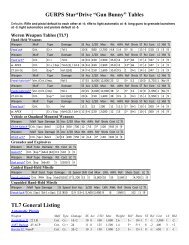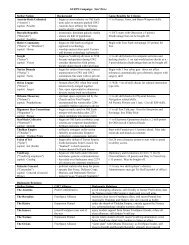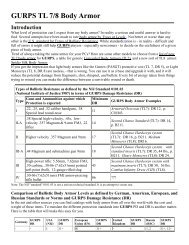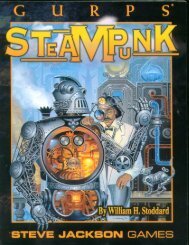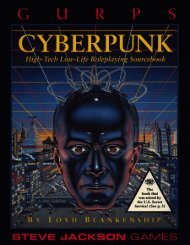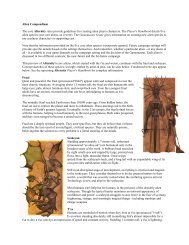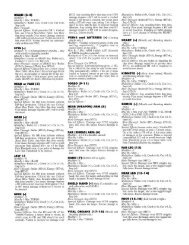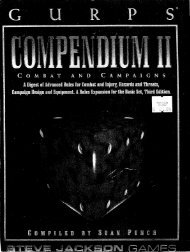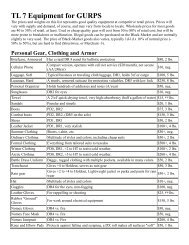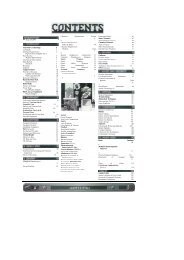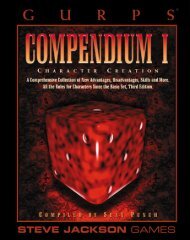When you improve a skill, the cost is the difference between your current skill leveland the cost of the new skill level. Example: You have a DX of 10 and a Shortswordskill of 13. This is DX+3 level, which, from the table on p. 43, costs 16 points for aPhysical/Average skill. The next level of skill, DX+4, costs 24 points. The differencebetween 16 and 24 is 8, so it will cost you 8 points to raise your Shortsword skill to alevel of 14.MoneyYou may also trade your earned character points for money. Each point is worthone month's income at your current rate, whatever that is (see Jobs, p. 192). The GMshould provide a reasonable explanation for your windfall: tax refund, buried treasure,inheritance, gambling winnings or whatever seems appropriate. Be creative. If a characteris a spy, and his cover is "professional tennis player," you could tell him that he earnedthe money by making a commercial for cornflakes.AGE AND AGINGHeroes, just like other people, eventually grow old . . . though they are less likely to diein bed.A character is assumed to be 18 years old when created, unless the player specifiedotherwise. Youth is a slight "disadvantage" - see p. 29. Age is not a "disadvantage"unless the character is over 50 when created - see p. 27. A character who is older than 18when he is created can put more character points into skills, because he has had longerto learn. (He does not get any bonus points unless he is over 50 - he is just allowed tospend more on education. See Choosing Your Beginning Skills, p. 43.)Decline Due to AgeBeginning on his or her 50th birthday, each character must roll yearly to see if oldage is taking its toll. If you do not wish to keep track of a character's exact birthday, justassume it as January 1, and roll every game-year as needed. Starting at age 70. roll every6 months. Starting at age 90, roll every 3 months!Roll 3 dice vs. Health for each of the four basic attributes; add your world's medicaltech level (see p. 186), minus 3, to your HT for the purpose of this roll. Thus, in amedieval (TL4) world, a person with HT 10 needs an 11 or less to succeed. A failed rollmeans that the attribute in question is reduced by one point - and a roll of 17 or 18 automaticallyfails and causes the loss of two points. Roll in the following order: ST, DX,IQ, HT.Obviously, if the last roll is failed, HT itself goes down by one . . . and the next "oldage" roll is more likely to fail. Thus, the decline accelerates. When an attribute is reducedby age (or by anything else, for that matter), all skills involving that attribute are alsoreduced. Thus, if aging reduces your IQ by 1, all your mental skills are lowered by 1. Ifany attribute reaches 0 from aging, the character dies a natural death. In a "real life"situation, a person would be carried away by a "minor" disease or accident long beforeHT reached zero, and this would still be considered as natural death.Certain magical and technological processes can halt aging, or even "set the clockback" to make a character younger. These devices, potions, etc., are extremely valuable,and will be described in specific game world books. If lost IQ (for instance) is restored,lost skill levels in mental skills are also restored.The timetable above is for humans. Aging for other races is described in the appropriategame world books.ImprovementThrough Study(Continued)Self-TeachingMost skills can be self-taught under theproper circumstances. If a skill cannot beself-taught, this will be indicated in theskill description. In any case, double thetraining time for a self-taught skill. A goodteacher - one who can guide your studiesand answer your questions - is tremendouslyvaluable in any field of learning.JobsIf you have a job, that counts as "study"of the skill (if any) used in the job.However, since most of the time on the jobis spent doing what you already know,rather than learning new things, time onthe job counts only 1/4 for learning. If youput in a 40-hour week, you can count it as10 hours of training in the work you'redoing. That works out to 500 hours oftraining in a year. If a job requires morethan one skill, you can split the trainingtime between them as you like.SchoolOn the other hand, if you go to school,you might spend three to six hours a weekin each class, plus another three to six inhomework - say an average of nine hoursper week. A semester is 21 weeks - so asemester of classroom study equals around200 hours per subject.Adventuring TimeAdventuring time can also count as"study" of the appropriate things; GMsshould be generous in allowing this. Forexample, a trek through the Amazon wouldcount for every waking moment - say 16hours a day - as study of Jungle Survival.You may study any number of skills atone time, but each hour of time onlycounts toward study of one subject unlessthe GM allows an exception. Languagestudy is a good example of an exception: Ifyou already speak French well, going toschool in Paris would count both forimproving your command of the languageand for study of the classroom subject. As arule, time spent in a foreign country,speaking the native language, counts asfour hours per day of language study nomatter what else you are doing, until yourskill with the language is equal to your IQlevel.
Skin, Hair and EyesYou may give your character any coloringyou like, as long as it is appropriate to hisor her background. If a random character isbeing rolled up, the following table may beuseful. Roll 3 dice three times - one roll forskin, one for hair and one for eyes. Discardany result (or combination of results)inappropriate to the adventure being played.A light-haired Oriental, for instance, would bequite possible in San Francisco in 1930, butmost unlikely in Peking in 1870. If you areplaying in a far-future game world, youmay wish to add some even more exoticpossibilities to the table.Die RollSkin Color3 Blue-black4-6 Black7 White with freckles8 White, tanned9-10 White11-12 Brown13-15 Light golden (Oriental)16 Golden17-18 Red-bronzeDie Roll Hair Color3 Blue-black4-5 Black6 Blond7 Bald (males only)8 Red-brown9 Light brown10-11 Brown12-13 Dark brown14 Gray15 Strawberry blond16 Bright red/orange17 Golden blond18 Pure whiteDie Roll Eye Color3 Purple4 Black5 Ice-blue6 Gray7-8 Blue9-11 Brown12 Hazel13 Green1415-16Dark blueDark green17 Golden18 Different colors! Roll again foreach.This system lets you create a character just by rolling dice. It can be used when theGM needs a non-player character in a hurry, or when you want to play without takingtime to create detailed characters. The average character will be about 100 points - butthere will be lots of variation! This can be fun, especially if you like to "take what thedice give you" and then roleplay that character faithfully. It is likely to give you at least oneattribute far lower than anything you would choose on your own!<strong>Basic</strong> AttributesRoll 3 dice for each of the four basic attributes - ST, DX, IQ and HT. If you wish,you may discard any one of the four rolls and try again - but you must keep the newroll, whatever it is!Completing Your CharacterAfter rolling up basic attributes, you have two choices. If you want a completelyrandom character, skip down to Physical Appearance. Determine advantages, disadvantagesand skills randomly, as described.Alternatively, you can keep your randomly-rolled attributes and take an additional 50points (assuming your campaign uses 100-point characters) to finish him any way youwant, choosing advantages, disadvantages and skills for yourself. Do not take 50 pointsand roll random skills, etc. - you'll get a superman.Physical AppearanceAll characters have average appearance unless they roll good or bad looks as anadvantage or disadvantage (below). Height and weight are determined as per p. 15. Skin,hair and eye color are determined by the table in the sidebar.Roll three dice and consult the table below to find your advantage (usually oneper character). Then roll again for a disadvantage.Die Roll Advantage(s) Disadvantage(s)3 Roll twice more Roll twice more4 Voice Poor5 Charisma (+6) Cowardly6 Alertness (+4) Odious Personal7 Common Sense Habit; -2 reaction8 Magical Aptitude (+2) Bad Temper9 Acute Vision (+5) Unlucky10 Alertness (+2) Greedy11 Charisma (+3) Overconfident12 Acute Taste/Smell (+5) Honest13 Danger Sense Hard of Hearing14 Attractive Appearance Unattractive Appearance15 Acute Hearing (+5) Bad Sight16 Handsome/Beautiful Hideous Appearance17 Roll twice more Roll twice more18 Roll twice more Roll twice moreIgnore any roll, and roll again, if:(a) you roll the same advantage or disadvantage twice;(b) you roll two kinds of personal Appearance (only the first one counts);(c) you roll a disadvantage that conflicts with an advantage you already have(e.g., Bad Sight after you have Acute Vision);(d) you roll an advantage or disadvantage that is meaningless in your gameworld (e.g., Magical Aptitude in a game world without magic).
- Page 3 and 4:
17. FLIGHT.........................
- Page 5 and 6:
Materials Needed for PlayThe GURPS
- Page 7 and 8:
WHAT IS ROLEPLAYING?A roleplaying g
- Page 9 and 10:
Character TypesThere are no "charac
- Page 12 and 13:
Four numbers called "attributes" ar
- Page 14 and 15:
You are free to set the physical ap
- Page 16 and 17:
REPUTATIONSome characters are so we
- Page 18 and 19:
These are character traits that are
- Page 20 and 21:
Legal Enforcement Powers 5, 10 or 1
- Page 22 and 23:
Rapid Healing5 pointsThis advantage
- Page 24 and 25:
A minor deity as Patron to a travel
- Page 26 and 27:
ReputationVariable (see p. 17)Socia
- Page 28 and 29:
Lame-15,-25, or -35 pointsYou have
- Page 30 and 31:
Bad Temper-10 pointsYou are not in
- Page 32 and 33: Dyslexia-5 or -15 pointsYou have a
- Page 34 and 35: Pacifism-15 or -30 pointsYou are op
- Page 36 and 37: Shyness-5,-10,-15 pointsYou are unc
- Page 38 and 39: You have a significant responsibili
- Page 40 and 41: A "quirk" is a minor personality tr
- Page 42 and 43: SpecializingRequired Specialization
- Page 44 and 45: MEANING OF SKILL LEVELSSo you have
- Page 46 and 47: Teamster (Mental/Average)Defaults t
- Page 48 and 49: Skiing (Physical/Hard)Defaults to D
- Page 50 and 51: Guns/TL (Physical/Easy)Defaults to
- Page 52 and 53: Any of these skills can be self-tau
- Page 54 and 55: Levels of Language SkillThis table
- Page 56 and 57: Most outdoor skills can be learned
- Page 58 and 59: PSIONIC SKILLSThese are special men
- Page 60 and 61: Forensics/TL (Mental/Hard)Defaults
- Page 62 and 63: Few Hundred Acres: Knowledge of far
- Page 64 and 65: Many skills in this category are ta
- Page 66 and 67: Lockpicking/TL (Mental/Average) Def
- Page 68 and 69: Gunner/TL See Combat Skills, p. 50M
- Page 70 and 71: Now you need to decide what equipme
- Page 72 and 73: Each suit of "real" armor includes
- Page 74 and 75: Listing Weapons On Your Character S
- Page 76 and 77: Recording Encumbrance on YourCharac
- Page 78 and 79: Passive Defense. The first blank is
- Page 80 and 81: The longer (and the more skillfully
- Page 84 and 85: Not all the advantages and disadvan
- Page 86 and 87: But remember . . . some skills have
- Page 88 and 89: ClimbingTo climb anything more diff
- Page 90 and 91: SwimmingThe Swimming skill (p. 49)
- Page 92 and 93: WILL ROLLSWhen a character is faced
- Page 94 and 95: The GURPS combat system is designed
- Page 96 and 97: WaitDo nothing unless a foe comes w
- Page 98 and 99: You may only block one attack per t
- Page 100 and 101: Missile WeaponsMissile weapons are
- Page 102 and 103: At the end of your move, if you hav
- Page 104 and 105: The rules for attacking a foe are e
- Page 106 and 107: tell you how long it will take. In
- Page 108 and 109: You may normally parry only one att
- Page 110 and 111: CLOSE COMBATUsing the Move, Step an
- Page 112 and 113: (adjusted) ST! Note that a shield h
- Page 114 and 115: Ranged Weapon StatsFor each ranged
- Page 116 and 117: second. On the table, this rounds u
- Page 118 and 119: If you are using the "hit location"
- Page 120 and 121: Removing or folding the stock of a
- Page 122 and 123: After the initial "freeze" ends, ea
- Page 124 and 125: ATTACKING INANIMATE OBJECTSThere ar
- Page 126 and 127: This subtraction will mostoften aff
- Page 128 and 129: Psionic healing (p. 175) and magica
- Page 130 and 131: DrowningSee the rules for Swimming,
- Page 132 and 133:
protects completely. Toughness prot
- Page 134 and 135:
Resolving mounted or vehicular comb
- Page 136 and 137:
Using Ranged Weapons From Horseback
- Page 138 and 139:
This section covers special rules f
- Page 140 and 141:
HT: Health and Hit PointsFor a roug
- Page 142 and 143:
Swarm AttacksA group of small creat
- Page 144 and 145:
Encumbrance and MovementEncumbrance
- Page 146 and 147:
A critical miss means the energy co
- Page 148 and 149:
oll will not end the spell, but the
- Page 150 and 151:
If the subject makes the resistance
- Page 152 and 153:
won't work. If anyone but the caste
- Page 154 and 155:
ANIMAL SPELLSThese are the spells r
- Page 156 and 157:
If the summoning spell is repeated,
- Page 158 and 159:
Cost: 1 for an object up to the siz
- Page 160 and 161:
Armor EnchantmentsThese spells work
- Page 162 and 163:
AuraInformationShows the caster a g
- Page 164 and 165:
Psionics, or "psi" abilities, are p
- Page 167 and 168:
GlossaryESP - Extra-Sensory Percept
- Page 169 and 170:
Psionics and MagicMagic and psionic
- Page 171 and 172:
PSYCHOKINESISThis power covers movi
- Page 173 and 174:
Pside EffectsPsi skills can have "s
- Page 175 and 176:
Limitations(Continued)Fickle: varia
- Page 177 and 178:
Player-Made MapsWhenever the player
- Page 179 and 180:
Predetermined ReactionsCertain NPCs
- Page 181 and 182:
Dealing with the PlayersArgumentsAs
- Page 183 and 184:
Time Use SheetsThe Time Use Sheet (
- Page 185 and 186:
Weapons and Armor0. Fists and stone
- Page 187 and 188:
Weather(Continued)WindWinds from ga
- Page 189 and 190:
Gold and SilverA traditional assump
- Page 191 and 192:
JobsThe jobs available in each game
- Page 193 and 194:
Job (Prerequisites), Monthly Income
- Page 195 and 196:
Sooner or later, every GM wants to
- Page 197 and 198:
Features of a GoodAdventureA good a
- Page 199 and 200:
World-BuildingA game world is a com
- Page 201 and 202:
CRITICAL HIT TABLEAll doublings or
- Page 203 and 204:
When the players meet an NPC whose
- Page 205 and 206:
Weapons are listed in groups, accor
- Page 207 and 208:
MODERN AND ULTRA-TECH WEAPONSWeapon
- Page 209 and 210:
ANCIENT/MEDIEVAL ARMORUse this tabl
- Page 211 and 212:
FANTASY/MEDIEVAL EQUIPMENTThe follo
- Page 231 and 232:
After eight printings of the GURPS
- Page 233 and 234:
of Divination should match the "fla
- Page 235 and 236:
Minor disadvantage: -5 points. Agai
- Page 237 and 238:
Whether through an accident of birt
- Page 239 and 240:
Note that this disadvantage is inco
- Page 241 and 242:
SKILLSARTISTIC SKILLSVideo Producti
- Page 243 and 244:
traders, and chess-like games are c
- Page 245 and 246:
If, during an adventure, a philosop
- Page 247 and 248:
VITAL ORGANSThese are optional rule
- Page 256 and 257:
INSTANT CHARACTERSThis quick refere


